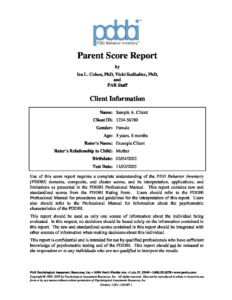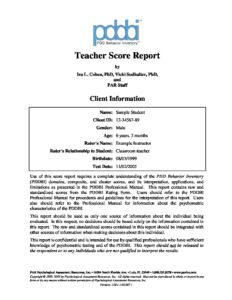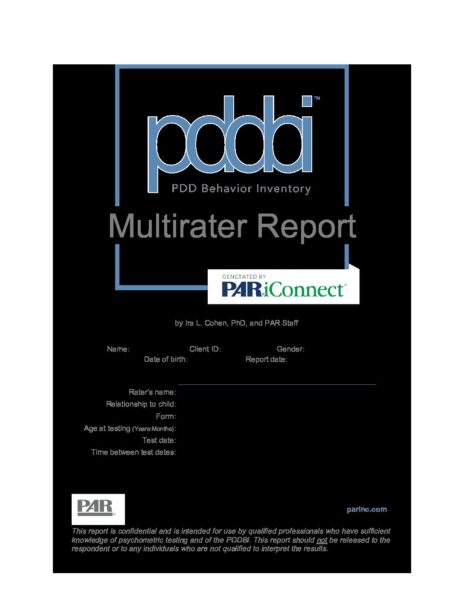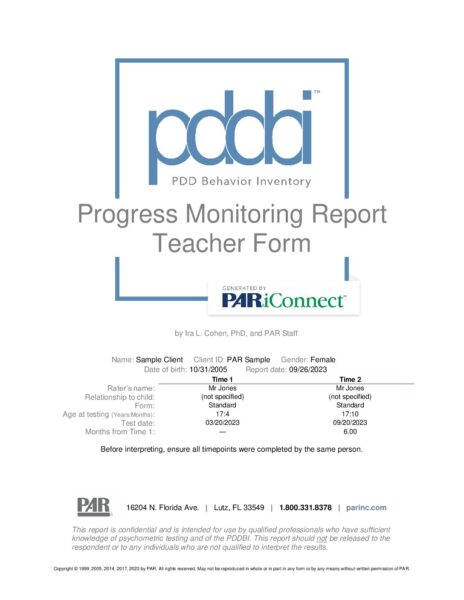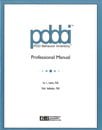
PDD Behaviour Inventory [PDDBI]
Assess responsiveness to intervention in children with ASD
For Ages: 1.6 – 18.5 years
Administration and Scoring: Paper-and-Pencil; Online administration and via PARiConnect online account; e-Manual
Length: 30-45 minutes for Extended Forms, 20-30 minutes for Standard Forms
Author: Ira L. Cohen, PhD, Vicki Sudhalter, PhD
Printed Manuals
Physical printed manuals.
Printed Forms & Handscoring Materials
Test forms, response booklets and scoring reference manuals.
Online Forms, Reports, Kits & e-Manuals
All online resources including Forms, Reports, i-Admins, Kits and e-Manuals.
PDDBI Professional Manual Supplement: ASD-DT
PDDBI Professional Manual Supplement: Adolescent Normative Data
PDDBI ASD-DT Record Forms (25)
PDDBI Parent Score Summary Sheets (25)
PDDBI Profile Forms – Parent or Teacher (50)
PDDBI Teacher Score Summary Sheets (25)
PDDBI online Score Report (each) min order 5
PDDBI online i-Admin (each) min order 5
Description
The PDDBI is an informant-based rating scale that is designed to assist in the assessment of children who have been diagnosed with Autism Spectrum Disorder (ASD). PDD is characterised by severe and pervasive impairments in several areas of development (e.g. communication skills, reciprocal social interaction skills, presence of stereotypic behaviours/activities). Unlike existing assessments for autism/PDD, the PDDBI was developed to assess both problem behaviours as well as appropriate social, language, and learning/memory skills. It also was designed to provide age-standardised scores for both parent and teacher ratings.
The PDDBI was developed with several primary goals in mind:
- To provide an assessment of autism that results in age-standardized scores.
- To create items that measure both problem behaviours and social communication skills relevant to autism.
- To include separate inventories for parents and teachers, in order to address the issue of generalization.
- To include a measurement system (i.e., Likert scaling) that has been shown to be useful in measuring responsiveness to intervention and/or detecting change.
- To create an assessment tool that would be sensitive to, and useful for, multiple applications (e.g., clinical, medical, school, research).
New in 2023
Document and evaluate change with the expanded and enhanced PDDBI.
- The enhanced PDDBI Score Report provides a new interpretive guidance section, a revised look and feel with icons clearly indicating score ranges, and an optional items and responses section.
- The new PDDBI Multirater Report allows you to select one parent rating and one teacher rating to get a detailed look at both sets of results, with significant differences clearly highlighted, both ratings plotted together on the profile, and an optional item and response section.
- The new PDDBI Progress Monitoring Report allows you to compare scores from one rater for up to four time points. Get a detailed look at progress or decline, with significant differences between time points clearly highlighted, all ratings plotted together on the profile, and an optional item and response section. Time point-by-time point comparison tables are also included.
- The new PDDBI Professional Manual Supplement: Advanced Score, Multirater, and Progress Monitoring Interpretation is a practical digital guide that helps you use and interpret PDDBI results from multiple raters and over time.
Features and benefits
- Unlike existing assessments for ASD, the PDDBI was developed to assess both problem behaviours as well as appropriate social, language, and learning/memory skills.
- Applicable in school, clinical, and research applications.
- Use the PDDBI for assessment, treatment planning, and treatment monitoring.
- The PDDBI (along with the SIPA, PSI-4-SF, and SRS-2) meet the requirements for ABA therapists working with autism patients who have federal health insurance (i.e., TRICARE).
- Age-standardized scores for parent and teacher ratings are provided in a new score report that more clearly indicates score ranges and provides items and responses organized by domain.
- Sophisticated, statistically driven reports identify differences between parent and teacher raters and measure change over time.
- A new multirater report highlights statistically significant differences between parent and teacher ratings to identify inconsistencies in behaviors across settings.
- A new progress monitoring report identifies statistically significant treatment gains or worsening behaviors over time.
- Access both reports for free in PARiConnect once you purchase a Score Report.
- Screen for autism in children, in 10 minutes, with the PDD Behavior Inventory Screening Version (PDDBI-SV).
Additional components
PDDBI Professional Manual Supplement: Advanced Score, Multirater, and Progress Monitoring Interpretation
This new supplement provides new guidance for calculation and interpretation of parent–teacher rating comparisons and tracking changes in scores over time, using Reliable Change Indices. In addition, it includes guidance for advanced interpretation of the PDDBI, from interpreting individual scores and clusters to comparing parent and teacher ratings and tracking scores over time. This manual supplement applies to ages 1:6 to 18:5 years.
PDDBI Professional Manual Supplement: Autism Spectrum Disorder Decision Tree (ASD-DT)
The ASD-DT is designed to enhance the diagnostic power of the PDDBI. Once a parent or teacher has completed the Extended Form, the ASD-DT allows you to use those scores to complete the branches of a decision tree that ultimately results in a diagnostic category. An algorithm is used to transform PDDBI scores into subgroups of ASD (Atypical ASD, Minimally Verbal ASD, or Verbal ASD) as well as non-ASD subgroups. Intervention suggestions and further recommendations are provided for all subgroups. The ASD-DT is designed to be used with individuals ages 1:6 to 12:5 years. PARiConnect reports automatically include the ASD-DT report when appropriate.
PDDBI Professional Manual Supplement: Adolescent Normative Data
This supplement extends the age range of the PDDBI normative data to age 18:5 years. Ideal for use when monitoring progress over time, this extension to the normative data can be used with both parent and teacher ratings on the PDDBI. The standardization sample includes individuals from a range of racial and ethnic backgrounds and geographic regions. The adolescent normative data are appropriate for use when either the standard or extended items are administered. The normative data are available on PARiConnect reports.
Supplemental material from PDDBI author Ira L. Cohen explains how to use the Autism Spectrum Disorder Decision Tree with the PDDBI for screening and intervention planning. A second white paper explains the creation and use of the new Spanish translation of the PDDBI Parent Form. Visit the Resources tab above to view or download.
Online administration in PARiConnect Online account
Leading the way in online assessment. In January 2013, PAR launched their new online assessment platform called PARiConnect. For over ten years, it is one of the most popular platform in the online assessment industry. Updated with features customers asked for, adding trustworthy instruments, PARiConnect remains in-demand-feature in the decades to come.
Why use the PDDBI online?
- Flexible administration options
- Powerful report options
- Client-centric design
- Reliable verification tools
- Easy and affordable purchase options via PAA website above
- Adaptability for any type of organisation
- Strict data security
- Simple technical requirements
- Enterprise manager




